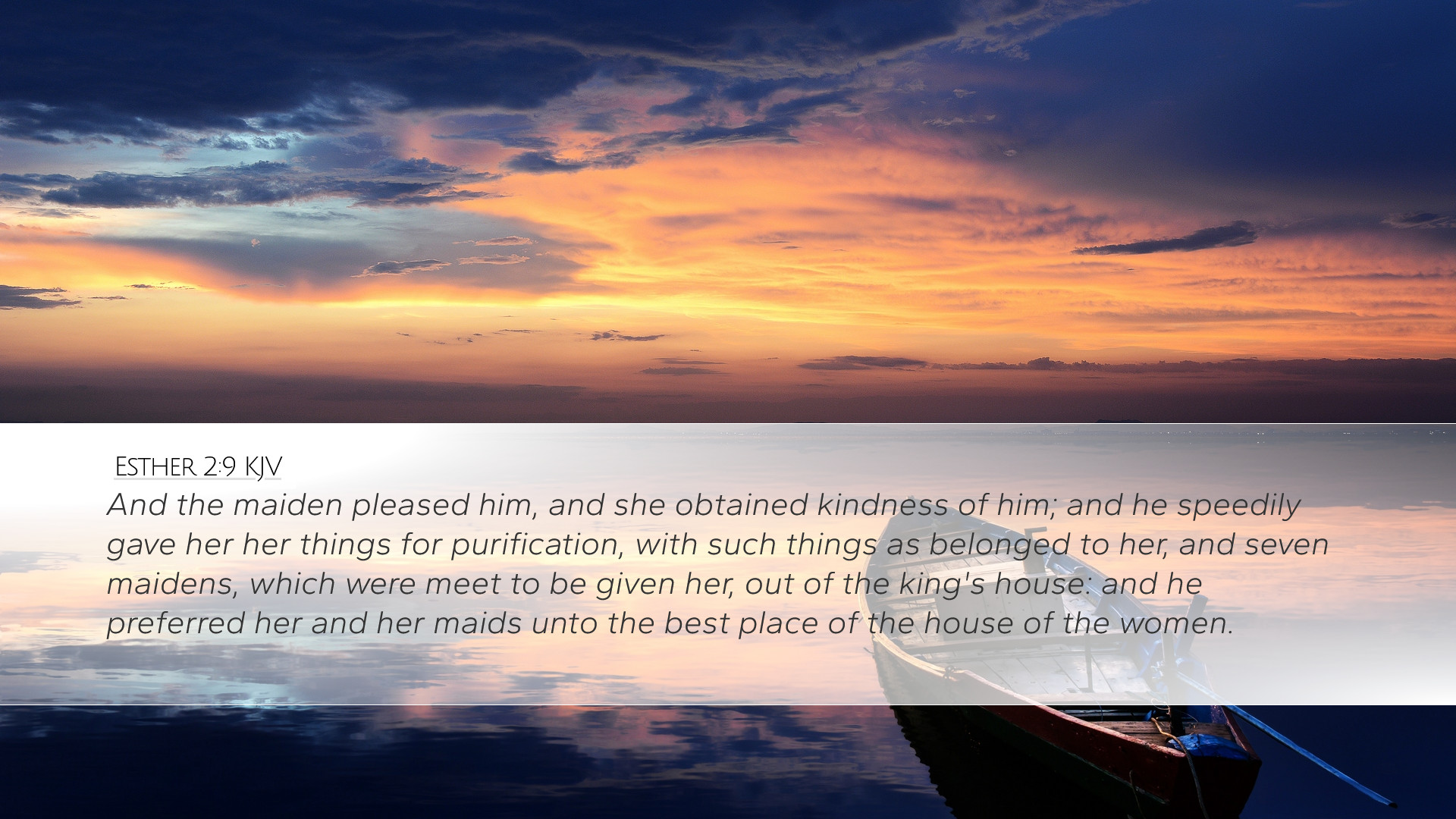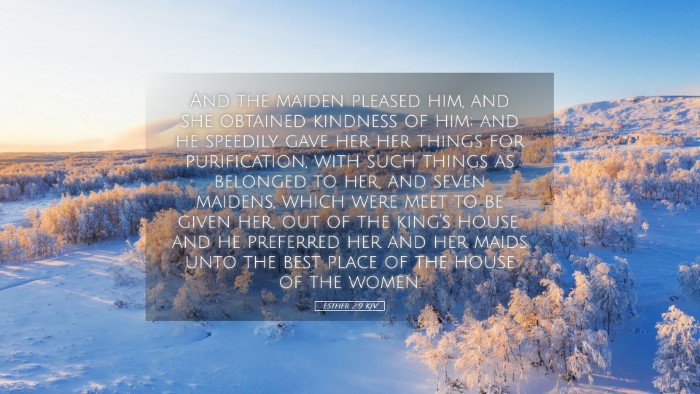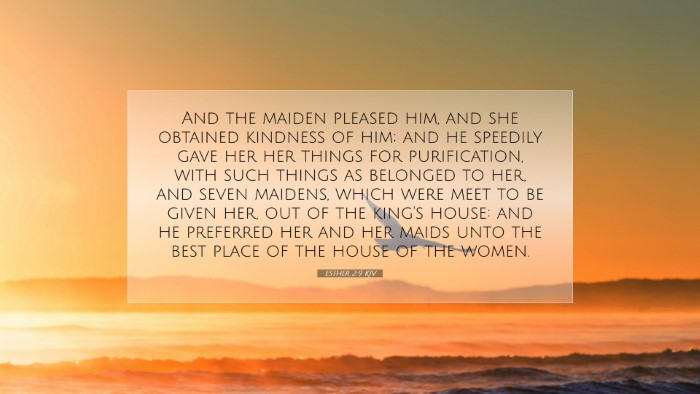Old Testament
Genesis Exodus Leviticus Numbers Deuteronomy Joshua Judges Ruth 1 Samuel 2 Samuel 1 Kings 2 Kings 1 Chronicles 2 Chronicles Ezra Nehemiah Esther Job Psalms Proverbs Ecclesiastes Song of Solomon Isaiah Jeremiah Lamentations Ezekiel Daniel Hosea Joel Amos Obadiah Jonah Micah Nahum Habakkuk Zephaniah Haggai Zechariah MalachiEsther 2:9
Esther 2:9 KJV
And the maiden pleased him, and she obtained kindness of him; and he speedily gave her her things for purification, with such things as belonged to her, and seven maidens, which were meet to be given her, out of the king's house: and he preferred her and her maids unto the best place of the house of the women.
Esther 2:9 Bible Commentary
Commentary on Esther 2:9
Esther 2:9 states: "And the maiden pleased him, and she obtained kindness of him; and he speedily gave her her things for purification, with such things as belonged to her, and seven maidens, which were meet to be given her, out of the king's house: and he preferred her and her maids unto the best place of the house of the women."
Introduction
This verse occurs in a significant narrative within the Book of Esther, which exhibits themes of providence, favor, and divine timing. The context in which Esther finds favor with Hegai, the king's chamberlain, is pivotal for understanding her future role as queen and her later impact on the Jewish people. This commentary synthesizes insights from Matthew Henry, Albert Barnes, and Adam Clarke.
Contextual Analysis
The story of Esther unfolds during the reign of King Ahasuerus (Xerxes I). Following the banishment of Queen Vashti, a search is initiated for a new queen. Esther, a Jewish orphan raised by her cousin Mordecai, is among the young maidens brought into the king's harem. This verse showcases Esther’s initial reception by Hegai, which sets the stage for her prominence in the story.
Favor in Preparation
Esther's pleasing demeanor and virtuous character attract Hegai's attention. Albert Barnes notes that the favor she receives is not superficial but indicative of her noble qualities. The Hebrew word for "pleased" suggests a deeper resonation with her character rather than mere physical beauty.
Significance of Purification and Provision
The "things for purification" mentioned in the text are vital for understanding the customs of preparation for the king's court. Adam Clarke elaborates on this by explaining the ritualistic preparations that emphasize purity and exclusivity, reflective of Persian royal protocol. This not only unveils the cultural context but also highlights God's providential care in Esther’s life, as she receives superior treatment among the other maidens.
Theological Insights
Divine Favor
One of the most profound themes in this verse is the idea of divine favor. As Matthew Henry articulates, Esther's favor with Hegai can be seen as an emblem of God's overarching control over the events that precede the deliverance of His people. This exemplifies how God often places individuals in strategic positions to fulfill His purposes.
God's Providence and Human Agency
The intersection of divine providence and human agency is a salient theme in the Book of Esther. The preparations that Esther undergoes are as much a reflection of her obedience and willingness to comply with the imposed structure as they are of God's orchestration. As noted by Barnes, Esther’s actions are not passive; she takes deliberate steps, demonstrating faith amidst uncertainty.
The Role of Inner Beauty
Commentators emphasize that while Esther's external beauty is acknowledged, it is her inner beauty that prevails. Hegai’s preference for her goes beyond mere appearance; it is her character and integrity that draw him to provide exceptional care. This idea is echoed across the biblical narrative, emphasizing the importance of virtues such as faithfulness, humility, and courage.
Practical Applications
This passage offers valuable lessons for believers today, particularly those in leadership or influential roles.
- Embrace Your Identity: Just as Esther was rooted in her Jewish identity, believers are encouraged to embrace their identity in Christ and allow it to guide their actions.
- Seek God’s Favor: Esther's experience teaches us the importance of seeking God’s favor through integrity and devotion, relying on His guidance in every step we take.
- Recognize Divine Providence: Understanding that God orchestrates events in our lives can cultivate patience and trust, particularly during times of uncertainty.
- The Impact of Character: This verse reminds us that character is often more influential than outward appearance, both in how we are perceived by others and in our impact on history.
Conclusion
Esther 2:9 encapsulates the beginning of a remarkable journey fraught with danger, yet upheld by divine providence. The combination of Esther's grace, Hegai's favor, and the significance of her preparations prepares us for the unfolding narrative that showcases God's redemptive work through unexpected vessels. Commentaries by Henry, Barnes, and Clarke collectively emphasize that through this historical event, we are reminded of the intricate ways in which God works through individuals, leading to salvation and restoration.


